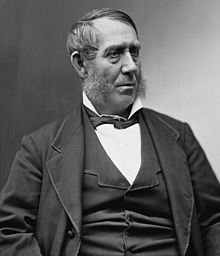On December 18, 1878, in the US Senate, during speeches on proposed changes to the patent laws, William Windom (May 10, 1827 – January 29, 1891), U.S. Senator from Minnesota gave a speech making remarkable charges but with little evidence. Though some of his underlying arguments are as valid now as then, they were somewhat hyperbolic. Excerpts follow:
 |
| William Windom |
Mr. WINDOM. Mr. President, the object of this amendment will be very apparent, and I will not take the time of the Senate to discuss it at any length. It is intended to remedy very great wrongs
which are being perpetrated under the cover of our patent law.
The law now gives to the patentee or to the purchaser of a patent a sweeping right of action against everybody. The proposed amendment takes away such right of action in the courts of the United
States against innocent parties who use the invention without knowledge of its existence an
open market from a dealer who is engaged in the sale of such articles or from the manufacturer thereof. The remedy still remains against the manufacturer and the seller. I think I am safe in saying that there are a hundred thousand patents to-day in the Patent Office of the United States for little insignificant inventions, covering every conceivable thing used in your kitchen, upon your farm, in your work shop, of which the persons buying have no means of knowledge. Now, the object of this amendment is to prevent the oppression and the great injustice that is being perpetrated upon hundreds of thousands of innocent people by means of the patent law. A common coal-stove, I am informed, is covered by at least twenty patents, almost every part of it; and your laws encourage the issue of the largest possible number of patents. If, for instance, an applicant thinks he has devised a new and useful kind of stove, and that device includes a dozen different contrivances, instead of taking out a single patent for the whole and getting a patent for that kind of stove, your laws and this bill, I believe, expressly provide that he may divide his application into different patents, giving him the opportunity after they are thus subdivided to assign one to A, another to B, another to C, and then for a single coal-stove which the poor man uses upon the prairies to keep his family from freezing a dozen men may sue him for a dozen different royalties.
I want to free him from such harassing and vexatious suits. Give the patentee his full redress against the vendor, against the manufacturer, or against the man who has knowledge of the patent, but do not send him into every farm-house and cottage in this country to harass the people with vexatious suits, about that of which they never could by any possibility have had knowledge. That is the object of this amendment.
Congressional Record for December 18, 1878, p. 270 (emphasis added).
